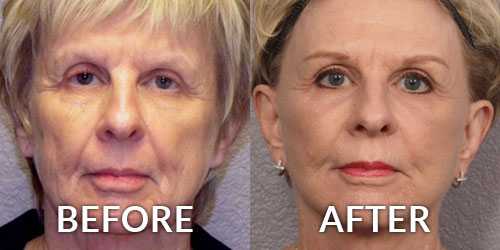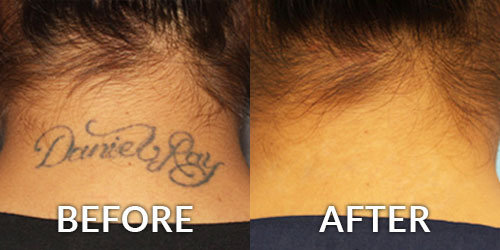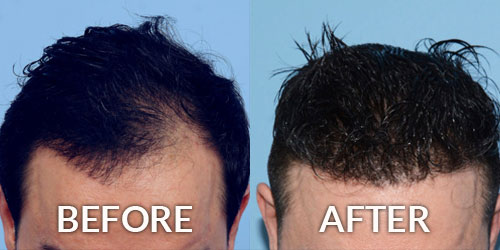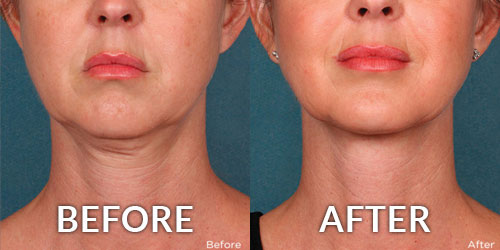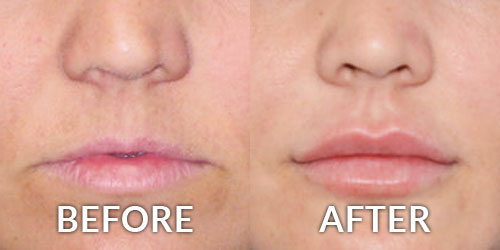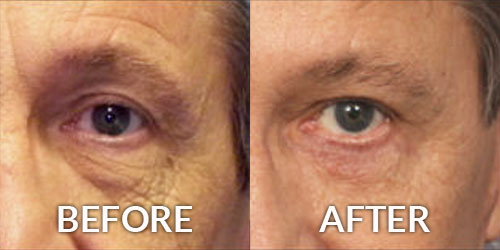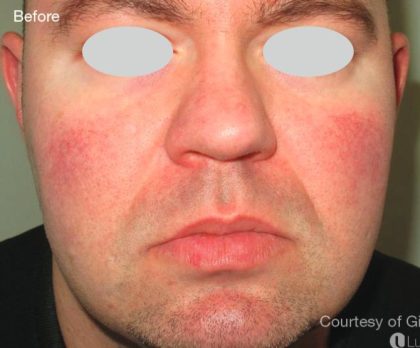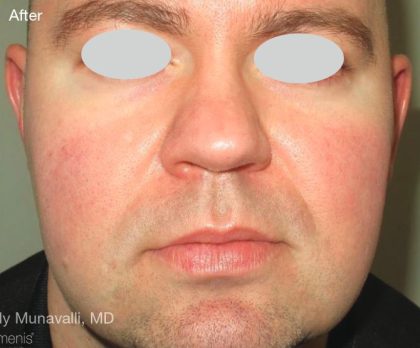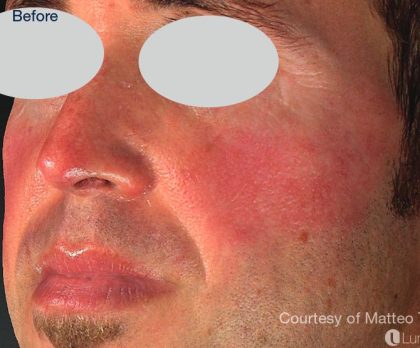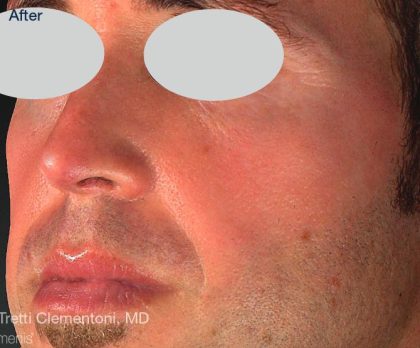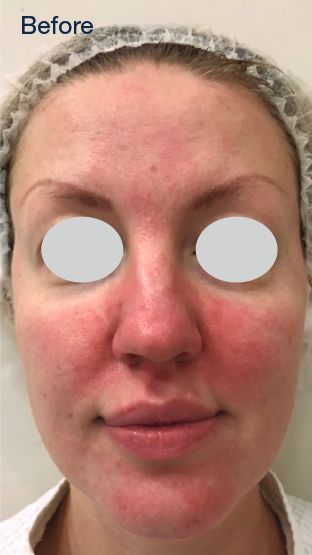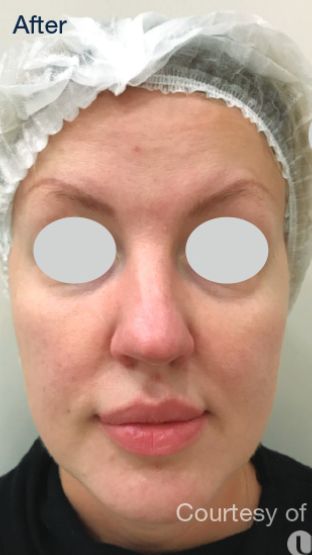Rosacea
Consultations offered at our two convenient locations in Phoenix and Scottsdale
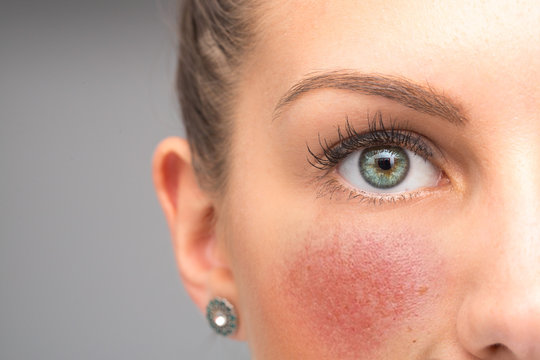
Rosacea is a chronic inflammatory skin condition that primarily affects the face, typically causing redness, flushing, and visible blood vessels. It can also lead to bumps, pimples, and thickened skin in severe cases. The condition most commonly affects people with fair skin, and it often begins after the age of 30. Although there is no cure for rosacea, there are effective treatments available to manage its symptoms.
Contents
Before and After Photos
At Phoenix Skin Medical, Surgical & Cosmetic Dermatology, we offer a variety of treatment options for rosacea, including topical creams, oral medications, and laser therapy. Our dermatologists will work with you to create a customized treatment plan that addresses your unique concerns and helps you achieve clearer, smoother, and more even-toned skin.
If you are struggling with rosacea, don’t let it negatively impact your self-confidence or quality of life. Schedule a consultation with one of our experienced dermatologists at our Phoenix, Arizona office today by calling (602) 222-9111, or (480) 473-9111 for our Scottsdale office. You can also complete a simple inquiry form on our website to get in touch.
Read the Phoenix Skin blog to learn more about dermatology in Phoenix and Scottsdale.
About Rosacea
Rosacea is a common skin condition that affects between 2-22% of fair-skinned people. (1) It is characterized by redness, flushing, and sometimes the appearance of small bumps or pustules on the face. In severe cases, the skin may thicken and develop a bumpy texture.
Types of Rosacea
Type 1: Erythematotelangiectatic Rosacea (ETR)
Type 1 rosacea is the most common form of the condition.
- Flushing of the face
- Skin redness (erythema)
- Spider veins (telangiectasias)
Type 2: Papulopustular Rosacea (Inflammatory Rosacea)
- Bumps
- Pimples
- Raised patches
Type 3:
Rhinophyma (Phymatous Rosacea)
- Nasal skin thickening
- “Bulbous” nose
- Enlarged pores
Ocular Rosacea
- Eye redness
- Watering eyes/foreign body sensation
- Eye swelling
At Phoenix Skin, we offer a variety of treatments to help patients with rosacea achieve clear, healthy-looking skin. From prescription medications to advanced laser and light therapies, our team of experienced dermatologists can help you find the right treatment plan for your unique needs.
Rosacea Treatments
Stellar M22 IPL
Intense pulsed light (IPL) therapy is an effective treatment for reducing redness and inflammation associated with rosacea. Our Stellar M22 laser system uses high-intensity pulses of light to target the blood vessels responsible for facial redness.
Research shows that IPL may be more effective in patients with more severe type 1 rosacea and in younger ETR sufferers. (2) This treatment is non-invasive and requires no downtime, making it an excellent option for busy patients looking for a quick and convenient solution to their rosacea symptoms.
Prescription Medications
There are several prescription medications available to help manage the symptoms of rosacea. Metronidazole, Ivermectin, and Financea are all topical creams that work to reduce inflammation and redness associated with rosacea.
Metronidazole
Metronidazole is an antibiotic and antifungal used to treat many different infections and skin conditions. Studies show that it is an effective treatment for patients with moderate to severe rosacea. (3)
Ivermectin
Topical ivermectin is usually indicated for the treatment of papulopustular rosacea. It targets demodex mites, tiny organisms that live in greater numbers in the skin of those with rosacea.
Finacea
Finacea is a gel specifically formulated to treat rosacea that contains the active ingredient azelaic acid. Azelaic acid is a tyrosinase inhibitor, which helps to fight hyperpigmentation and balance skin tone.
Doxycycline
In some cases, low-dose oral doxycycline may also be prescribed to help manage symptoms.
Chemical Peels
Chemical peels can be an effective treatment for reducing the appearance of redness and inflammation associated with rosacea. During a chemical peel, a solution is applied to the skin that causes the top layer of skin to peel away, revealing fresh, healthy-looking skin underneath. This treatment can also help to shrink pores and improve skin texture and tone.
Red Light Therapy
Red light therapy is a non-invasive treatment that uses low-level light energy to stimulate collagen production and reduce inflammation. In addition to treating rosacea, it can be especially effective for reducing the appearance of fine lines and wrinkles, and can also help to improve skin texture and tone.
IPL/YAG Combination Therapy
For patients with more severe rosacea symptoms, a combination of IPL and YAG laser therapy may be recommended. This treatment works by targeting both the blood vessels responsible for redness and inflammation, as well as the sebaceous glands that can contribute to acne-like bumps and pustules on the skin.
At Phoenix Skin Medical, Surgical & Dermatology, we understand the impact that rosacea can have on your self-confidence and quality of life. That’s why we offer a comprehensive range of treatments to help you achieve clearer, healthier-looking skin. Contact us today to schedule a consultation and learn more about how we can help you manage your rosacea symptoms.
Benefits of Rosacea Treatment
Here are some of the benefits you can expect from our approach to treating rosacea:
- Reduced redness and flushing
- Alleviation of stinging and burning sensations
- Improved skin texture and tone
- Minimized appearance of broken blood vessels and bumps on the skin
- Customized treatment plans tailored to your unique needs and goals
- Use of advanced technology and techniques for safe and effective results
- Expert guidance from experienced and knowledgeable dermatologists
- Comprehensive care that addresses all aspects of your skin health
At Phoenix Skin Medical, Surgical & Dermatology, we understand how frustrating and disruptive rosacea can be to your daily life. That’s why we are dedicated to providing you with personalized care and effective solutions to help you achieve clear and healthy-looking skin. Contact us today to schedule a consultation and learn more about how we can help you.
Candidates
The ideal candidates for rosacea treatment are those who experience frequent flushing, persistent redness, visible blood vessels, and acne-like bumps on their cheeks, nose, chin, or forehead. At Phoenix Skin Medical, Surgical & Dermatology, our board-certified dermatologists specialize in diagnosing and treating various forms of rosacea, from mild to severe. During your consultation, we will evaluate your skin type and medical history to determine the best course of action for your individual needs.
Personal Consultation
At a personal consultation in Phoenix or Scottsdale, we will find the most effective treatment for your rosacea moving forward.
Physical Examination
During your consultation, our team will assess the severity of your rosacea and discuss any triggers that may exacerbate your symptoms. We’ll review your medical history and current skincare routine to ensure that any treatments we recommend are safe and effective for you.
Nutrition & Trigger Counseling
All rosacea patients at Phoenix Skin receive thorough nutrition and trigger counseling.
Common rosacea triggers include the following:
- Sun Exposure
- Stress
- Heat
- Alcohol Consumption
- Wind
- Spicy Foods
- Heavy Exercise
- Cold Weather
- Medications
- Cosmetics
No matter what treatment plan is recommended, the team at Phoenix Skin is dedicated to helping you find relief from rosacea symptoms. Contact us to book your personal consultation with one of our skin experts.
Cost of Rosacea Treatment in Phoenix
When it comes to treating rosacea, the cost can vary depending on the specific treatment plan that is customized for each patient. The severity of the condition, the type of treatment required, and the number of sessions needed will all factor into the final cost. At Phoenix Skin Medical, Surgical & Dermatology, we are committed to providing our patients with affordable options that fit their budget while still providing the best possible results. To schedule your consultation and learn more about our pricing options, call our Phoenix office at (602) 222-9111 or our Scottsdale location at (480) 473-9111.
FAQ
What causes rosacea?
The exact cause of rosacea is unknown, but it is believed to be a combination of genetic and environmental factors. Some triggers that can exacerbate rosacea include alcohol consumption, spicy foods, stress, and exposure to sunlight.
Is there a cure for rosacea?
While there is no cure for rosacea, it can be managed with proper treatment. This typically involves a combination of topical creams, oral medications, and lifestyle changes such as avoiding triggers that can exacerbate symptoms.
Can laser treatment help with rosacea?
Yes, laser treatment can be an effective way to manage rosacea. Specifically, intense pulsed light (IPL) therapy can target the blood vessels that contribute to the redness and inflammation associated with rosacea.
Can rosacea be treated with topical products alone?
While topical products can be helpful in managing mild cases of rosacea, more severe cases will likely require additional treatments such as oral medications or laser therapy.
Can rosacea be prevented?
While there is no surefire way to prevent rosacea, there are steps you can take to reduce your risk of developing it. These include wearing sunscreen daily, avoiding triggers such as extreme temperatures and spicy foods, and keeping stress levels under control.
How long does it take to see results from rosacea treatment?
The timeline for seeing results from rosacea treatment can vary depending on the severity of your condition and the type of treatment you are receiving. In general, it may take several weeks or even months to see significant improvement. It’s important to be patient and consistent with your treatment plan.
References
- Rainer BM, Kang S, Chien AL. Rosacea: Epidemiology, pathogenesis, and treatment. Dermato-Endocrinology. 2017;9(1):e1361574. doi:https://doi.org/10.1080/19381980.2017.1361574
- Lim HS, Lee SC, Won YH, Lee JB. The Efficacy of Intense Pulsed Light for Treating Erythematotelangiectatic Rosacea Is Related to Severity and Age. Annals of Dermatology. 2014;26(4):491. doi:https://doi.org/10.5021/ad.2014.26.4.491
- McClellan KJ, Noble S. Topical metronidazole. A review of its use in rosacea. American Journal of Clinical Dermatology. 2000;1(3):191-199. doi:https://doi.org/10.2165/00128071-200001030-00007
- Sahni DR, Feldman SR, Taylor SL. Ivermectin 1% (CD5024) for the treatment of rosacea. Expert Opinion on Pharmacotherapy. 2018;19(5):511-516. doi:https://doi.org/10.1080/14656566.2018.1447562


